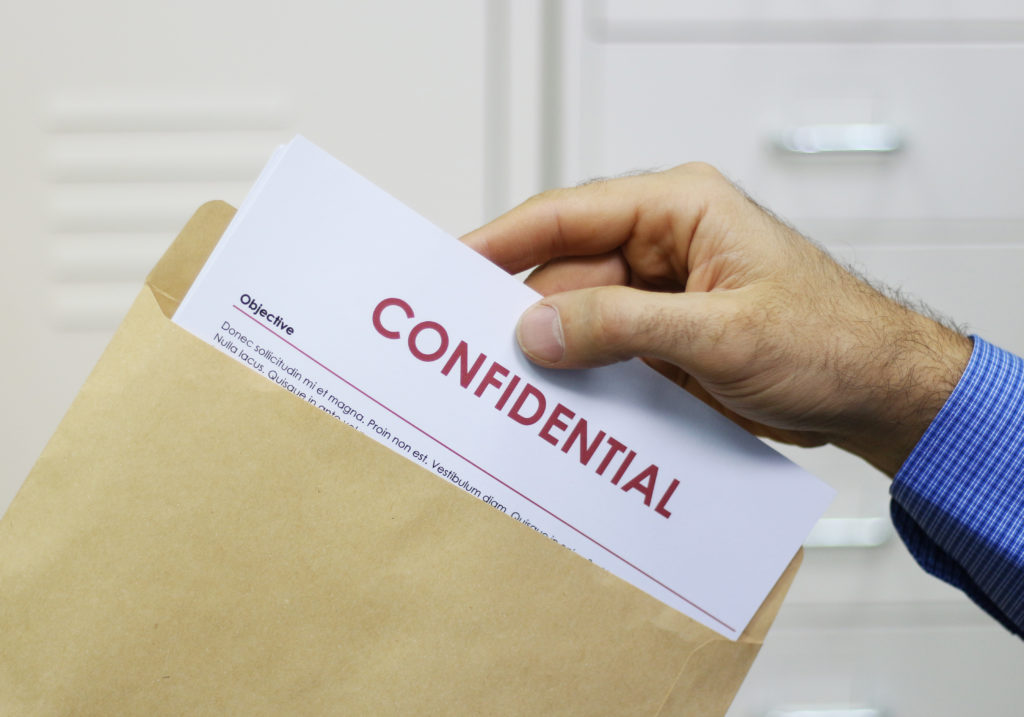“Settlement agreements are highly confidential and could be harmful to either or both parties to the IPR if disclosed. Yet the language of Section 317(b) makes it at least facially possible for anyone to request access to these agreements.”
 Once an inter partes review (IPR) has been instituted at the Patent Trial and Appeal Board (PTAB), it will generally proceed to final written decision, unless the parties settle their dispute and agree to terminate the IPR. As a prerequisite to termination, the PTAB requires the parties to file their settlement agreement, as well as any collateral agreements, with the PTAB before an IPR will be terminated.
Once an inter partes review (IPR) has been instituted at the Patent Trial and Appeal Board (PTAB), it will generally proceed to final written decision, unless the parties settle their dispute and agree to terminate the IPR. As a prerequisite to termination, the PTAB requires the parties to file their settlement agreement, as well as any collateral agreements, with the PTAB before an IPR will be terminated.
Interestingly, 35 U.S.C. § 317(b) also provides that filed settlement agreements “shall be made available only to Federal government agencies on written request, or to any person on a showing of good cause.” This language has, understandably, caused some concern for parties about filing their settlement agreements with the PTAB. As a general matter, settlement agreements are highly confidential and could be harmful to either or both parties to the IPR if disclosed. Yet the language of Section 317(b) makes it at least facially possible for anyone to request access to these agreements without defining the circumstances under which the agreements could be disclosed.
Current Process for Ensuring Confidentiality
The U.S. Patent and Trademark Office (USPTO) rules provide some methods by which parties can protect the confidentiality of their settlement agreement. First, the PTAB allows parties to request that the agreements be filed as “business confidential information.” Documents with this designation are kept separate from the rest of the IPR file and are not available to the public. “Business confidential information,” and specifically settlement agreements, however, is not excluded from Section 317(b)’s potential disclosure provisions. Unified Patents LLC v. Cassiopeia IP LLC, IPR2020-00111, Paper 16 at 3 (July 2, 2020).
Second, the PTAB allows parties to request that they be notified if the PTAB is considering a request for access to a settlement agreement. Arista Networks, Inc. v. Catlemorton Wireless, LLC, IPR2020-00986, Paper 7 at 4 (Oct. 28, 2020). The PTAB has not been consistent in its response to such notification requests. In at least one case, the PTAB agreed to notify the parties and give them a chance to respond to an access request. However, the PTAB is not required to notify the parties and has, on that basis, declined such requests in other cases. Israel Weapon Indust. Ltd. v. Smart Shooter, Ltd., IPR2020-01420, Paper 11 at 4 (Mar. 31, 2021) (denied request to be notified); Dell Inc. v. 3G Licensing S.A., IPR2020-01157, IPR2020-01158, –01159, –01160, –01161, –01162, Paper 47 at 3 (Dec. 14, 2021) (denied request to be notified).
There is little guidance—statute, rule, case law, or otherwise—on requirements that must be met to justify access to business confidential settlement agreements under Section 317(b). For third parties, there is no description of what constitutes “good cause” and there is similarly no explanation of what contents are required of a Federal government agency “written request.” The discussion that follows is thus an educated guess on what may happen.
‘Good Cause’ and FOIA
For third party access, the authors are aware of only one case where the PTAB analyzed what may constitute “good cause” under Section 317(b). In Arista Networks v. Castlemorton Wireless, the PTAB reassured parties that their settlement agreement would be protected. Arista Networks, IPR2020-00986, Paper 7 at 3-4. The PTAB explained that a third party must satisfy a “high burden” to prove that it has “good cause” for accessing the agreement. For example, they said that an “alleged nexus” to an ongoing post-grant review would not be “good cause.” Although the PTAB did not analyze the issue in depth, the PTAB noted that it would only consider a third party request for access to a settlement agreement in a “rare” case.
It is possible for a third party to seek access to a settlement agreement viz-a-viz a Freedom of Information Act (FOIA) request. However, the U.S. Supreme Court’s ruling in Food Marketing Institute v. Argus Leader Media may shield disclosure of these agreements under Exception 4 to FOIA. Food Mktg. Inst. V. Argus Leader Media, 139 S. Ct. 2356, 2366 (2019). Exception 4 prevents “commercial or financial information obtained from a person” that is “confidential” from being disclosed in response to a FOIA request. The Court ruled that “[a]t least where commercial or financial information is both customarily and actually treated as private by its owner and provided to the government under an assurance of privacy,” the information is “‘confidential’ within the meaning of Exemption 4.” Parties generally treat their settlement agreements as confidential. The PTAB also allows the parties to file the agreements under Section 317(b) as “business confidential information” and, by USPTO rule, these agreements are thus kept separate from the IPR file. Arista Networks, IPR2020-00986, Pater 7 at 4. For these reasons, it seems likely that Exception 4 would apply to shield settlement agreements from disclosure under FOIA.
Safe for Now
Given the uncertainty surrounding this issue, the authors contacted the USPTO to inquire how many times third parties have requested access to settlement agreements under Section 317(b), both directly and under FOIA, and how many of those requests were granted. The USPTO stated that it has not received or granted any such requests as of the time of publication.
It seems that settlement agreements are safe for now. But there remains a risk and practitioners should keep on the lookout.

![[IPWatchdog Logo]](https://ipwatchdog.com/wp-content/themes/IPWatchdog%20-%202023/assets/images/temp/logo-small@2x.png)

![[[Advertisement]]](https://ipwatchdog.com/wp-content/uploads/2024/04/Patent-Litigation-Masters-2024-banner-early-bird-ends-Apr-21-last-chance-938x313-1.jpeg)


![[Advertisement]](https://ipwatchdog.com/wp-content/uploads/2024/04/Patent-Litigation-Masters-2024-sidebar-early-bird-ends-Apr-21-last-chance-700x500-1.jpg)

![[Advertisement]](https://ipwatchdog.com/wp-content/uploads/2021/12/WEBINAR-336-x-280-px.png)
![[Advertisement]](https://ipwatchdog.com/wp-content/uploads/2021/12/2021-Patent-Practice-on-Demand-recorded-Feb-2021-336-x-280.jpg)
![[Advertisement]](https://ipwatchdog.com/wp-content/uploads/2021/12/Ad-4-The-Invent-Patent-System™.png)







Join the Discussion
One comment so far.
Pro Say
April 20, 2022 02:40 pmThere is no justifiable reason for the government to have the IPR settlement / collateral agreements in the first place.
More government overreach — sticking their nose where it doesn’t belong.
Exactly who at the Patent Office has access to such highly-confidential agreements? PTAB “judges?” (only those on the deciding panel? other ones?) Other PTO staff attorneys? “Assistants?” Other PTO staff?
The curious fellow down the hall?
Where / how are the agreements stored? For how many years? Forever?
Who has access once stored?
Look; when the parties settle, they settle.
The fact that they do settle should be enough.
Someone should take this to the CAFC / SCOTUS.
Yes, I know . . . but would the PTAB / PTO refuse to terminate if the parties didn’t include the agreement?
How ’bout we find out.